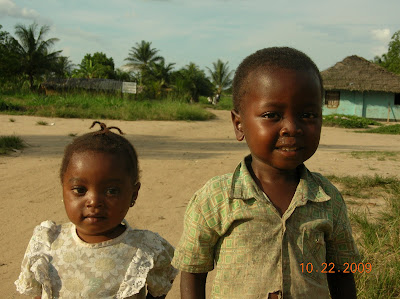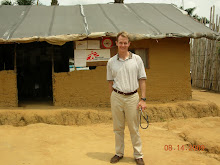
This morning I was running around the hospital doing my usual morning preparations. Passing by the Pediatric Ward I saw a striking little boy. He waved and said "bonjour" like the other children. But he was wearing a necklace and wore a homemade crown. I stopped and took his picture and told him that today he was the King of Pediatrics.
The MSF hospital in Lubutu is likely one of the best in the Democratic Republic of Congo. It is a Hôpital Générale de Référence, a place where sicker patients can be referred from their primary care Centres de Santé. In the West, a general community hospital would be the closest equivalent. Most of the wards are the same—Internal Medicine, Pediatrics, Maternity, and Surgery. In addition, this hospital also has a cholera ward and isolation rooms for viral hemorrhagic fevers, like Ebola.
The patient experience is different than in the West. When hospitalized, patients are assigned to a metal bed with a plastic mattress, a single sheet, and an overhanging mosquito net. Almost everyone (including adults) has an accompaniant—a family member or relative who stays with them, does their laundry, cooks their food, and helps with care. All medical care is free of charge. That is a good thing because patients are in the hospital for a very long time.
Those who have encountered hospital care in the West know about Length of Stay. In the US, the government has determined the number of hospital days necessary to care for someone with nearly every medical diagnosis. Private insurance companies follow these anticipated Length of Stay rules. These rules have shortened in my medical career. For example, when I was in training, a woman giving birth stayed in the hospital for two or three nights. Now it is one night.
If a patient remains in the hospital longer than the anticipated Length of Stay, the physician must justify the patient's continued hospitalization to the government (Medicare and Medicaid) or the insurance company. Several times I have had to speak to someone at an insurance company daily in order to keep a sick child in the hospital.
There aren't any Length of Stay rules here in Lubutu. Patients are hospitalized for much longer than in the US or Europe. Why? There are several possibilities.
Perhaps here in Lubutu, by the time patients get to the hospital they are sicker than people in the West. Maybe the diseases are at a more advanced state before patients go to their neighbourhood Centre de Santé. Likely more important is the lack of follow-up for patients discharged from the hospital. At home, if a patient has severe pneumonia, they might be treated with intravenous antibiotics and oxygen for a few days, then switched to oral medicines. One day later they go home with a follow-up appointment with their primary care physician. The entire structure of having one's own health care provider is missing here. If someone is discharged from the Lubutu hospital remaining even slightly ill and told to see their neighbourhood Centre de Santé in follow-up the next day, it is very unlikely to go well. The patient likely has either no (or incomplete) medical records with them. They Consultant they see may not know them. There is no mechanism where the Consultant can contact someone at the hospital to see what occurred. Consequently, patients must remain in the hospital until they are 100 percent cured and back to normal. This makes for long hospitalizations.






